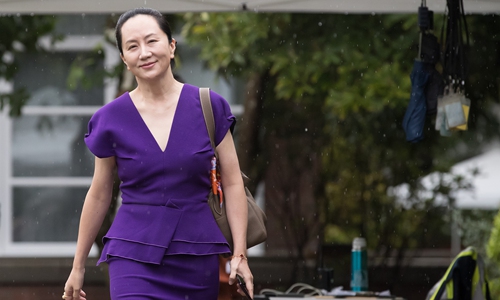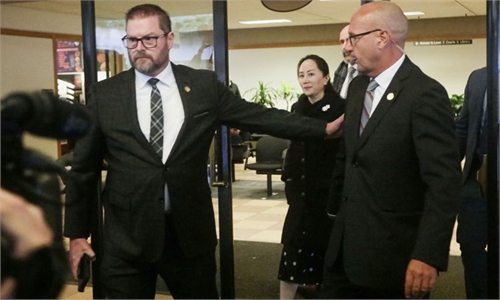Huawei's Meng likely to be freed if Canada has judicial independence: legal experts

Huawei Chief Financial Officer Meng Wanzhou.Photo:VCG
Legal experts are cautiously optimistic toward a key ruling over Huawei Chief Financial Officer Meng Wanzhou's case set to be released on Wednesday, noting that Meng is "highly likely" to be freed from a purely legal perspective if Canada truly has the judicial system completely independent from any political influence, as it always boasts.
On Wednesday, a decision on a key legal aspect of the trial over whether Meng, who's also the daughter of Huawei founder Ren Zhengfei, can be extradited to the US from Canada will be announced, the British Columbia Supreme Court said.
The decision will deal with the charge of double criminality, deciding whether Meng's actions were crimes in Canada and the US at the time of her arrest. If Wednesday's ruling shows that Meng's actions were not a crime in Canada, the Huawei executive could be freed and returned to China.
"I think it is possible that the case could end this week," Gary Botting, author of Canadian Extradition Law Practice and Extradition between Canada and the US, told the Global Times. "Had Canada the jurisdiction to act against Meng as a criminal, it would have done so. But it does not have extraterritorial jurisdiction - nor does the US. Therefore, Meng's alleged conduct is not criminal in either the US or Canada."
"The US fancies itself as policing the world, but it cannot be allowed to impose its political will on its technological rivals in such a cavalier manner," said the Vancouver-based legal expert.
Zhi Zhenfeng, a legal expert at the Chinese Academy of Social Sciences in Beijing, echoed Botting, noting that if looking at the case purely from a legal perspective, it's highly possible that Meng could be discharged immediately.
"However, that's only an ideal scenario, as the case is too complicated with too many political factors involved," Zhi told the Global Times on Tuesday.
China's position on the Meng Wanzhou incident is consistent and clear. The US and Canada have abused their bilateral extradition treaty, arbitrarily taken compulsory measures against Chinese citizens, and seriously violated the legitimate rights and interests of Chinese citizens. This is a serious political event, Chinese Foreign Ministry spokesperson Zhao Lijian said on Tuesday.
The Chinese government's determination to safeguard the legitimate rights and interests of Chinese citizens is unwavering. The Canadian side should effectively correct its mistakes, immediately release Meng Wanzhou, and ensure that she returns to China safely, so as to avoid a further deterioration of China-Canada relations, Zhao said.
Zhi added that even if the judge determines that the alleged representations of Meng would be considered criminal, the case may still last years, as the local court still needs to handle appeals such as whether the Canadian officials detained Meng with substantive reasons and based on the legal process.
British Columbia Supreme Court Associate Chief Justice Heather Holmes would preside over an in-person court appearance by Meng and the other parties once the decision is released Wednesday, Reuters reported.
Meng was arrested in Canada on December 1 at the behest of the US, which is widely believed to be politically motivated to counter China's rise in the high-tech industry led by Chinese tech giant Huawei. In a fresh move to further contain the Chinese firm, the Trump administration on May 16 moved to block shipments of semiconductors to Huawei from global chipmakers.
Coming at a critical time, Meng's ruling is also believed by many as an opportunity for Canada to remove "the last" stumbling block between its ties with China, which has been strained after Meng's arrest but saw improving signs during the COVID-19 pandemic with efforts from both countries.
Since the coronavirus hit the world, China and Canada have been cooperating in the anti-epidemic fight, and are also cooperating on developing COVID-19 medicines and vaccines.
In February, when China was hit hard by the virus, the Trudeau government provided 16 tons of anti-virus supplies. Later in March, the Bank of China returned the favor by donating medical supplies, including 30,000 medical masks, 10,000 sets of protective clothing, 10,000 goggles, and 50,000 pairs of gloves, followed by N95 medical masks.
Moreover, Canada has been keeping a rational attitude toward the US' well-calculated campaign of "holding China accountable" for the COVID-19 pandemic.
"Canada has been under pressure from the US at the beginning, or the country could have benefited from the trade war between the world's two largest economies," Mei Xinyu, an expert close to China's commerce ministry, told the Global Times on Tuesday.
"If the country continues to choose to meddle in the case, it may only continue its role of a scapegoat in the geopolitical tussle between China and the US," Mei said.
Even if the relationship between China and the US improves, Canada could still suffer from strong sentiment from the Chinese public once it makes an "unjustified ruling" toward Meng, experts said.



